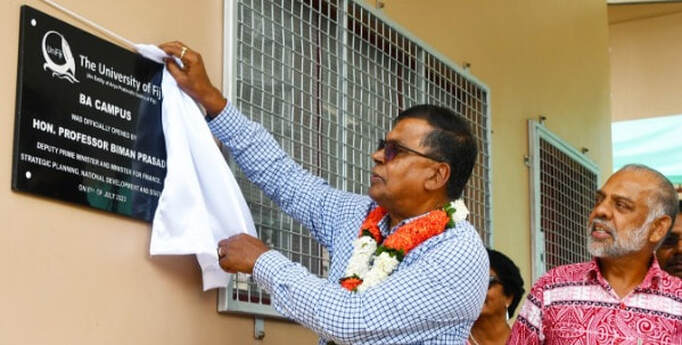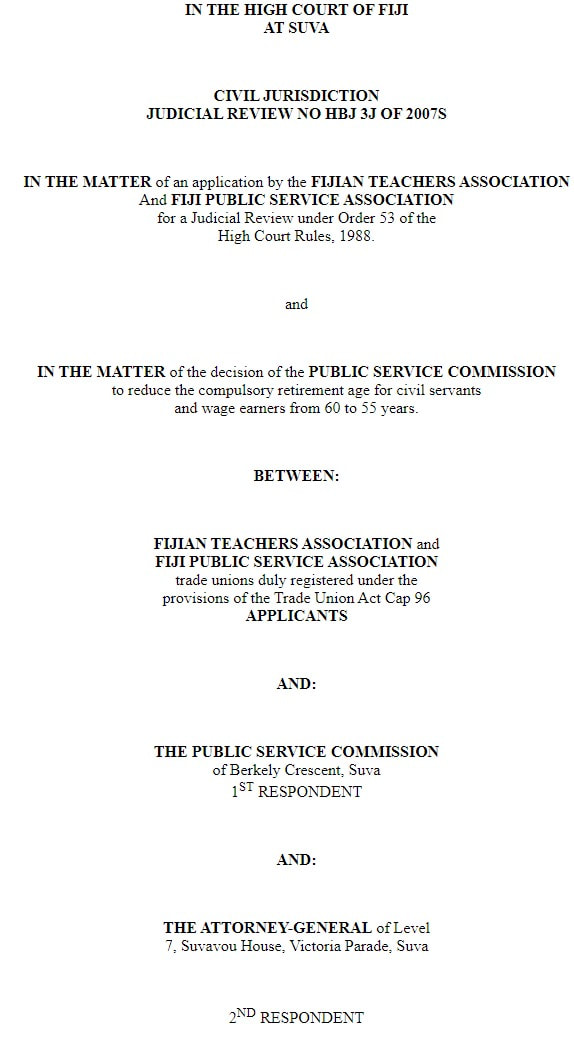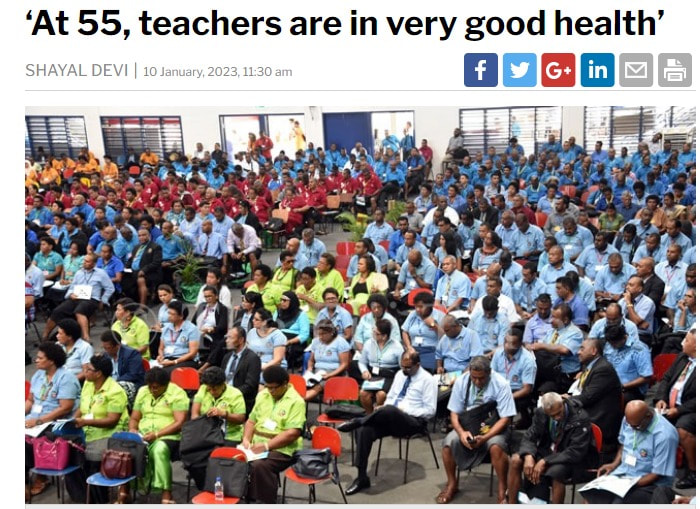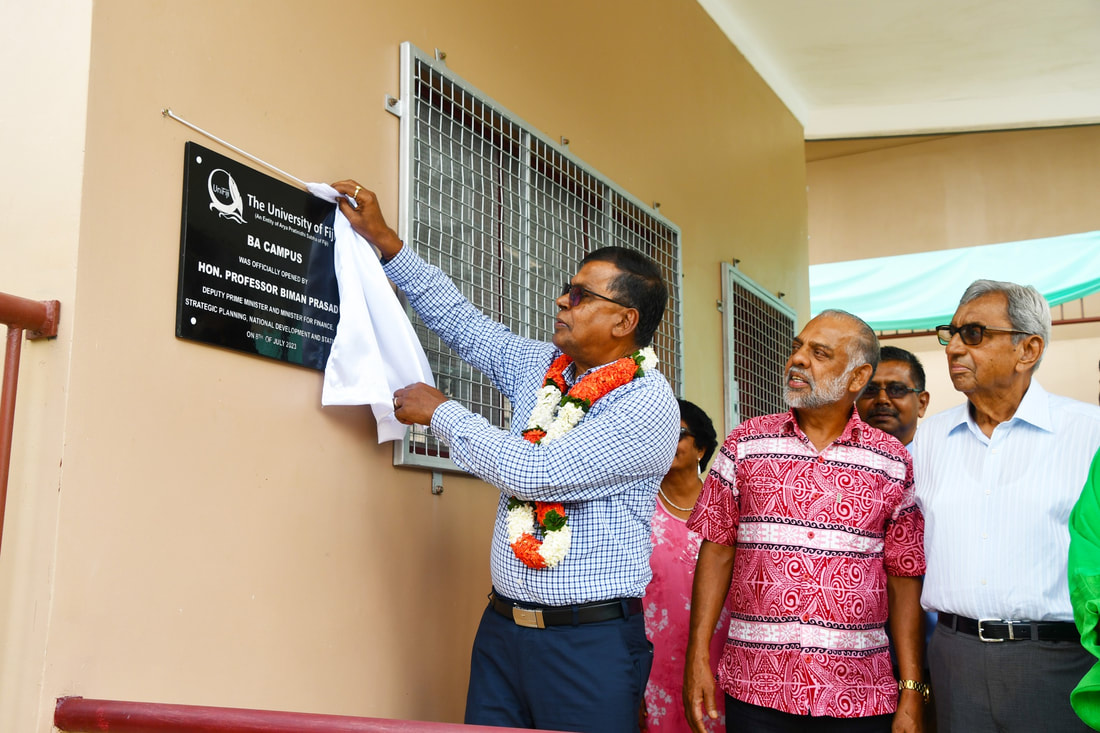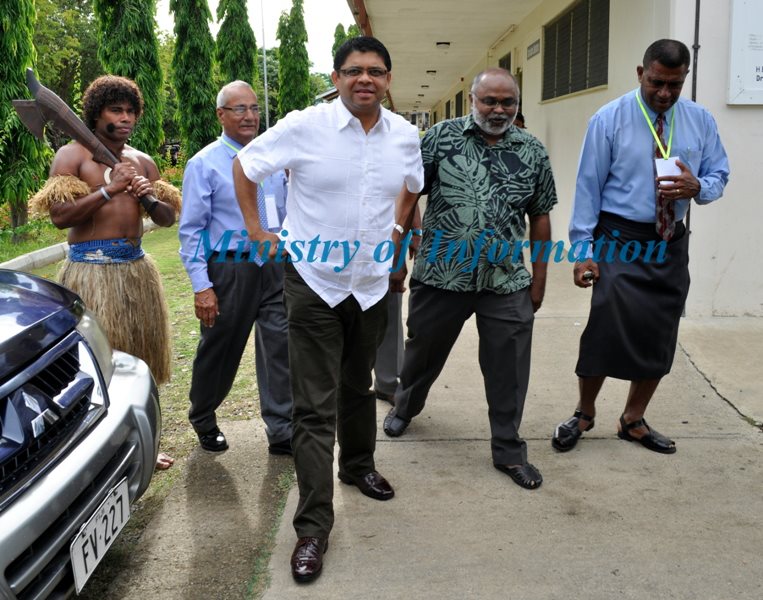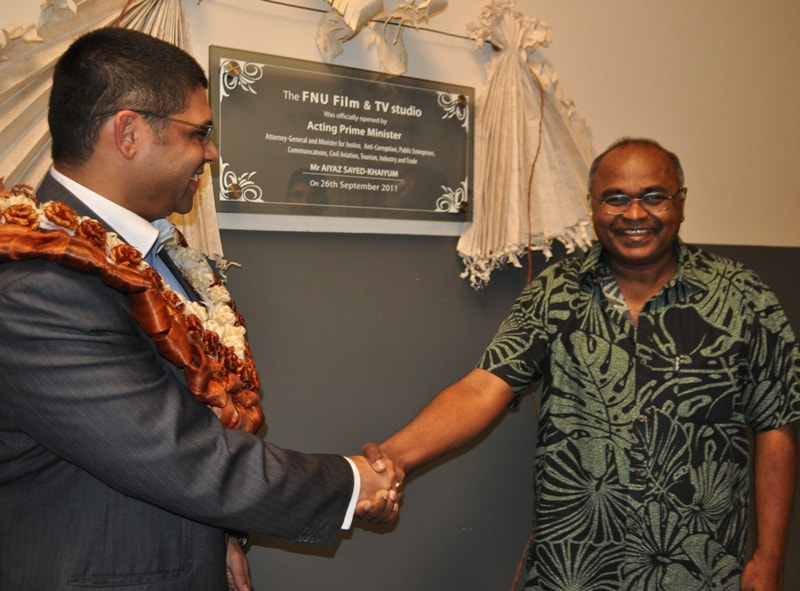*Arya Samaj, Agni and ASERI: We were shocked to learn that Education Minister ASERI RADRODRO was not invited to open UniFiji Ba CAMPUS
*Coalition government Employment Minister Agni Deo is singing from a different course work book. In January 2023, he claimed:
*But in 2007, Agni Deo was accused of selling out his Fiji Teachers Union members, many of those who were unfairly turfed out at 55 years of age were members of his own union, and were paying for his 'duck and puri' each weekend.
*The Interim Military regime issued a decision dated 9 March 2007 purporting to lower the compulsory retirement age of civil servants from 60 to 55 years. The Fijian Teachers Association and the Fiji Public Service Association (The Applicants) challenged the regime's decision in the Fiji High Court. The two unions claimed that the regime did not have the lawful authority to lower the compulsory retirement age to 55 since the Cabinet was not constituted in accordance with the Constitution (Amendment) Act 1997.
*In response, the regime submitted the affidavits of the Secretary of the Public Service Commission, Ms Taina Tagicakibau, and Agni Deo Singh, the General Secretary of the Fiji Teachers Union ("FTC") to support its policy considerations.
*The then Fiji High Court judge Filimoni Jitoko, while ruling against the interim military regime, had disclosed Agni Deo Singh's affidavit:
"Agni Leo Singh on behalf of FTLI, lay great emphasis on employment of undergraduates, and the need to implement the new 55 compulsory retirement age, as a way of reducing the unemployed. Mr Singh estimates the number of undergraduates as over 2000 with 800 qualified teachers amongst them. In Mr Singh's submission, many of the government employees that will be affected would have served for at least 34 years and at 55 they are eligible for their FNPF contributions which he suggested, that “they may take this as a lump sum and start a business of their own or receive it by way of fortnightly pensions”. This argument I must say, lacks any merit whatsoever. First, as the Applicants make clear; not all employees would have served at least 30 years in the service. Not all employees would have accumulated enough FNPF funds at 55 to retire or start their own business or come under a suitable pensionable scheme. In any case, the fact that not everyone will be in the same position, is discriminatory of itself...There is also a grave danger of the policy falling foul of the provisions of section 140 of the Constitution that deals with the recruitment and promotion policy in all the State services.'
Conclusion
In the end, it is the findings of this Court:
1. that the Appellants possess the legal capacity and persona to represent their individual members, in bringing actions under Chapter 4 of the Constitution;
2. the Respondents, by lowering the mandatory retirement age of civil servants to 55, without the agreement of the affected party, had acted in breach of section 38 of the Constitution which protects an individual from discrimination on the basis of age;
3. that the Respondents have failed to satisfy the threshold requirements of what is reasonable and justifiable in a democratic society that would have provided the exception to section 38 as permissible under sub-section (7);
4. that the Respondents had, by not consulting and reaching an agreement with the Applicants, on amendments to the Master Collective Agreement, failed to observe the basic rules of natural justice;
5. that the Respondents by not preferring to refer the matter as a trade dispute under the Act, had acted contrary to the legitimate expectations of the Applicants.
In the result a Declaration is made that the decision of 9 March 2007 is in breach of section 38 of the Constitution. It is unlawful and therefore null and void.
An Order of Certiorari is made removing the said decision into this Court, and the decision be and is hereby quashed.
Costs is summarily assessed at $850 to each of the Applicants to be paid within l4 days.
F. Jitoko
JUDGE
At Suva
Thursday 20th December 2007
In the end, it is the findings of this Court:
1. that the Appellants possess the legal capacity and persona to represent their individual members, in bringing actions under Chapter 4 of the Constitution;
2. the Respondents, by lowering the mandatory retirement age of civil servants to 55, without the agreement of the affected party, had acted in breach of section 38 of the Constitution which protects an individual from discrimination on the basis of age;
3. that the Respondents have failed to satisfy the threshold requirements of what is reasonable and justifiable in a democratic society that would have provided the exception to section 38 as permissible under sub-section (7);
4. that the Respondents had, by not consulting and reaching an agreement with the Applicants, on amendments to the Master Collective Agreement, failed to observe the basic rules of natural justice;
5. that the Respondents by not preferring to refer the matter as a trade dispute under the Act, had acted contrary to the legitimate expectations of the Applicants.
In the result a Declaration is made that the decision of 9 March 2007 is in breach of section 38 of the Constitution. It is unlawful and therefore null and void.
An Order of Certiorari is made removing the said decision into this Court, and the decision be and is hereby quashed.
Costs is summarily assessed at $850 to each of the Applicants to be paid within l4 days.
F. Jitoko
JUDGE
At Suva
Thursday 20th December 2007
Fiji Court of Appeal overturned Justice Jitoko's judgment: RETIRE AT 55
In March 2009, the three Court of Appeal judges – Justice John Byrnes, Justice Andrew Bruce and Justice Izaz Khan allowed the interim regime's appeal and quashed Justice Jitoko’s earlier decision.
In his decision, Justice Bruce said: “The rejection of the PSC’s argument by the trial judge (Jitoko) was without foundation because he had no evidence upon which he could decide the extent to which the public servants would have served 30 years”.
“Secondly, there was no evidence to determine the extent to which the public servants would have accumulated enough FNPF funds at 55 to retire and start their own businesses”.
The three judges said Justice Jitoko did not give sufficient weight to the evidence of PSC Permanent Secretary Taina Tagicakibau and Fiji Teacher’s Union General Secretary Agni Deo Singh in relation to the advantages which would be gained by the reduction in the retirement age from 60 to 55.
Tagicakibau in her affidavit of September 26, 2007 said the Government would save $79,519,530 when the reduction in retirement age policy came into effect from January 1 this year. She added: “If posts were filled selectively according to areas of need, the government would save up to $10,455,610 when this policy is put into effect”.
In his affidavit of September 21, 2007, Singh said by the age of 55 years, civil servants would have worked for at least 30 years and would have met all obligations in relation to their children's education.
He said: “There are over 2000 graduates who are unemployed. 800 of these are qualified teachers. A large number of these 800 qualified teachers would have been trained by government at Advance College of Education and Lautoka Teachers College or at the USP on a scholarship”.
“A large number of these unemployed graduates are sons and daughters of poor people who would have taken loans for education of their children Government employment becomes the last and sometimes the only venue for employment because of the limited opportunity for employment in the private sector.”
The three judges said Tagicakibau and Singh were not cross-examined on their affidavits and in their view, the duo’s evidence should have been accepted by Justice Jitoko.
“If he had done so, it would not have been possible for him to conclude as he did.”
The Court also ordered that the two unions, FTA and FPSA, to pay court costs of $3,500.
FAST FORWARD TO JANUARY 2023
Minister for Employment, Productivity and Industrial Relations, Agni Deo Singh, says the extension of the retirement age to 60 does not necessarily mean younger people will not find employment.
He referenced the teaching sector, saying there had been a lot of issues with school leadership in the past.
“At 55, teachers are in very good health and they’ve been in leadership positions for a few years only and they have five more years of good leadership services to provide,” he said.
“We have been losing all that very badly. So with that back at the end of the day, it is the schools and the children, it is the quality of education that will benefit because you cannot take experience away and compensate with an academic qualification.
“It doesn’t mean somebody who has come with a PhD with six, seven years of service or 10 years of service is equal to someone who has 25 or 30 years of service in leadership, through the system into the leadership, can never be equated. It’s quite different.
“Particularly with the ground you need to work through the mill to understand the ropes, understand the system, to acquire those knowledge and skills and experience that you only get when you get that on the job, hands-on experience. We have all learned that way.”
He said there was still a need to employ more teachers in schools around the country, and there were instances whereby teachers holding secondary school teaching qualifications were recruited to teach primary school students.
“I think in teaching itself, we require a lot more teachers in primary school, there is a dire shortage. We have got secondary school teachers with secondary school qualifications teaching in primary schools.
“Now we will have to retrain those teachers. We can’t lay them off. You know, we have to retrain them and they’re secondary school teachers, but we are still faced with a lot of shortage of teachers.
“A lot of brain drain has taken place. Yes. And then we put these large class sizes in the primary schools to actually address which has never been attended to despite all those calls being made.”
Mr Singh said in cases where a teacher had to take on larger volumes of students in a single class, a portion of students would be left behind, resulting in a serious issue.
“Non-readers is a serious issue for us. We need to address this. So yes, while we will have mature people in leadership, we still need a lot of establishments, a lot more teachers at the lower level assisting.
“So it’s all about getting the resources together and just employing more teachers. It will be a challenge in terms of funding, knowing what we have been burdened with, we have inherited in terms of debts, but we have to make sure that we improve the delivery of education.”
He referenced the teaching sector, saying there had been a lot of issues with school leadership in the past.
“At 55, teachers are in very good health and they’ve been in leadership positions for a few years only and they have five more years of good leadership services to provide,” he said.
“We have been losing all that very badly. So with that back at the end of the day, it is the schools and the children, it is the quality of education that will benefit because you cannot take experience away and compensate with an academic qualification.
“It doesn’t mean somebody who has come with a PhD with six, seven years of service or 10 years of service is equal to someone who has 25 or 30 years of service in leadership, through the system into the leadership, can never be equated. It’s quite different.
“Particularly with the ground you need to work through the mill to understand the ropes, understand the system, to acquire those knowledge and skills and experience that you only get when you get that on the job, hands-on experience. We have all learned that way.”
He said there was still a need to employ more teachers in schools around the country, and there were instances whereby teachers holding secondary school teaching qualifications were recruited to teach primary school students.
“I think in teaching itself, we require a lot more teachers in primary school, there is a dire shortage. We have got secondary school teachers with secondary school qualifications teaching in primary schools.
“Now we will have to retrain those teachers. We can’t lay them off. You know, we have to retrain them and they’re secondary school teachers, but we are still faced with a lot of shortage of teachers.
“A lot of brain drain has taken place. Yes. And then we put these large class sizes in the primary schools to actually address which has never been attended to despite all those calls being made.”
Mr Singh said in cases where a teacher had to take on larger volumes of students in a single class, a portion of students would be left behind, resulting in a serious issue.
“Non-readers is a serious issue for us. We need to address this. So yes, while we will have mature people in leadership, we still need a lot of establishments, a lot more teachers at the lower level assisting.
“So it’s all about getting the resources together and just employing more teachers. It will be a challenge in terms of funding, knowing what we have been burdened with, we have inherited in terms of debts, but we have to make sure that we improve the delivery of education.”
